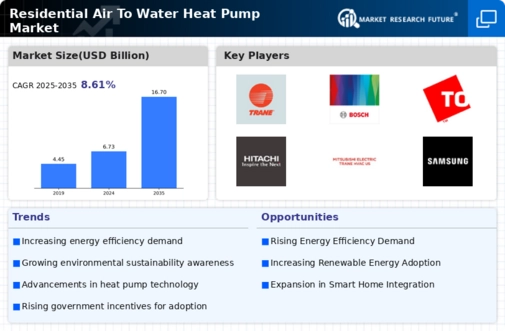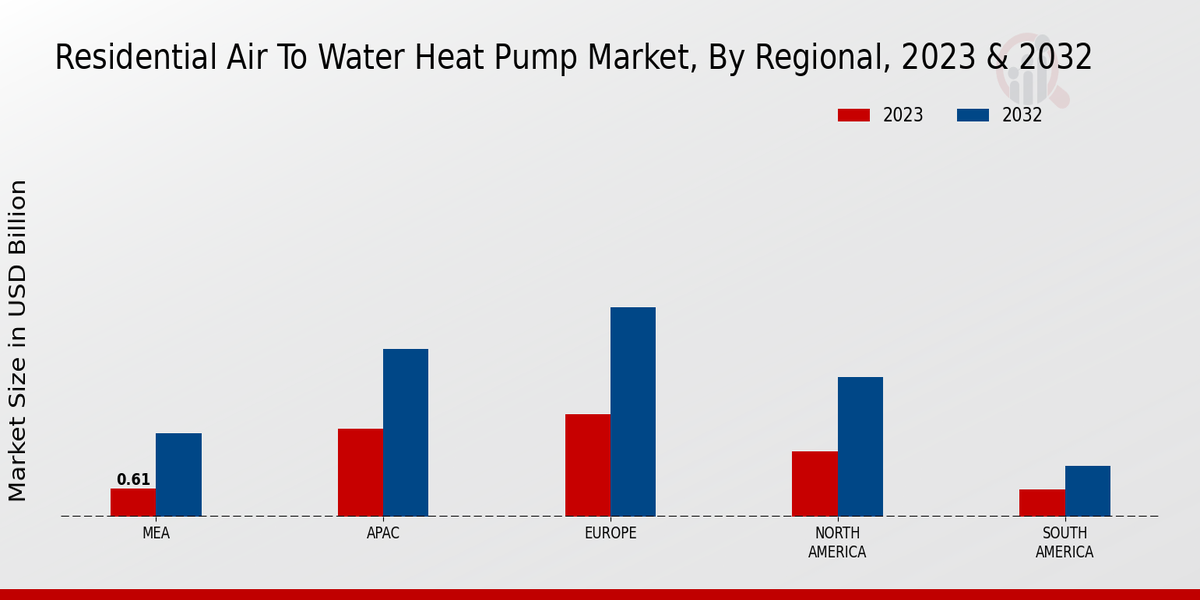Market Growth Projections
The Global Residential Air To Water Heat Pump Market Industry is poised for substantial growth, as evidenced by market projections. The industry is expected to reach a value of 6.73 USD Billion in 2024, with a remarkable compound annual growth rate (CAGR) of 8.61% anticipated from 2025 to 2035. This growth trajectory indicates a strong demand for air to water heat pumps, driven by factors such as energy efficiency, government incentives, and increasing consumer awareness. The market's expansion reflects a broader trend towards sustainable heating solutions, positioning air to water heat pumps as a critical component of future residential energy systems.
Technological Advancements
Technological innovations are transforming the Global Residential Air To Water Heat Pump Market Industry, enhancing the efficiency and performance of heat pump systems. Advances in inverter technology, smart controls, and improved refrigerants contribute to higher energy efficiency and lower operational costs. These developments not only make air to water heat pumps more appealing to consumers but also align with global sustainability goals. As manufacturers continue to innovate, the market is likely to benefit from increased adoption rates. The anticipated compound annual growth rate (CAGR) of 8.61% from 2025 to 2035 underscores the potential for growth driven by technological advancements.
Growing Demand for Energy Efficiency
The Global Residential Air To Water Heat Pump Market Industry experiences a notable surge in demand driven by the increasing emphasis on energy efficiency. Homeowners are increasingly seeking sustainable heating solutions that reduce energy consumption and lower utility bills. This trend is reflected in the projected market value of 6.73 USD Billion in 2024, indicating a robust interest in energy-efficient technologies. Governments worldwide are also promoting energy-efficient systems through incentives and rebates, further stimulating market growth. As consumers become more environmentally conscious, the adoption of air to water heat pumps is likely to rise, contributing to the industry's expansion.
Government Incentives and Regulations
Government policies play a pivotal role in shaping the Global Residential Air To Water Heat Pump Market Industry. Many countries are implementing stringent regulations aimed at reducing carbon emissions and promoting renewable energy sources. Incentives such as tax credits, grants, and rebates for installing air to water heat pumps encourage homeowners to invest in these systems. For instance, various European nations have established programs that support the adoption of heat pumps, leading to increased market penetration. As regulations become more favorable, the market is expected to witness accelerated growth, with projections indicating a market value of 16.7 USD Billion by 2035.
Rising Awareness of Environmental Impact
The growing awareness of environmental issues significantly influences the Global Residential Air To Water Heat Pump Market Industry. Consumers are increasingly concerned about their carbon footprints and are seeking eco-friendly alternatives for heating and cooling their homes. Air to water heat pumps, which utilize renewable energy sources, present a viable solution for reducing greenhouse gas emissions. This shift in consumer behavior is prompting manufacturers to focus on sustainable practices and energy-efficient products. As awareness continues to rise, the market is expected to expand, with more homeowners opting for heat pumps as a means to contribute to environmental sustainability.
Increasing Urbanization and Housing Development
Urbanization and the corresponding rise in housing development are key drivers of the Global Residential Air To Water Heat Pump Market Industry. As populations migrate to urban areas, the demand for efficient heating and cooling solutions in residential buildings escalates. New housing projects are increasingly incorporating air to water heat pumps as standard features, recognizing their benefits in terms of energy efficiency and sustainability. This trend is particularly evident in regions experiencing rapid urban growth. The integration of heat pumps in new constructions is likely to bolster market growth, aligning with the projected increase in market value to 16.7 USD Billion by 2035.















